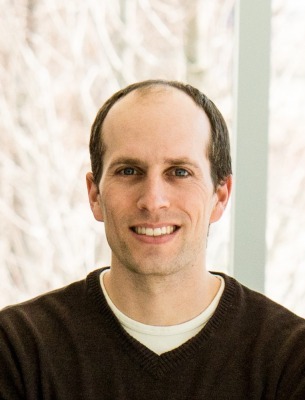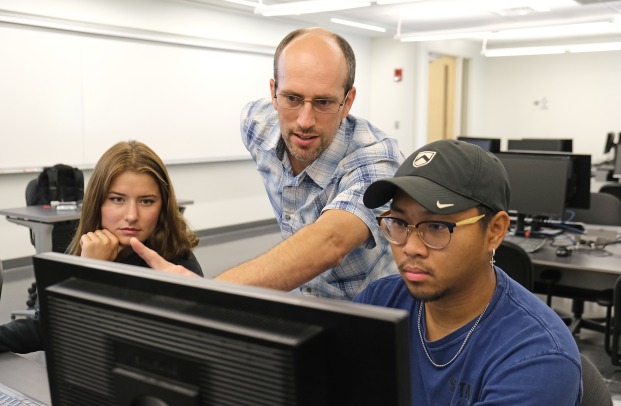Faculty Spotlight: Reid Parsons

Dr. Reid Parsons is an associate professor in the Earth, Geographic and Public Health Sciences department here at Fitchburg State.
Reid was born and raised in the rugged desert of northwestern Colorado in a region most known for cattle ranching, oil drilling and coal mining. Both of Reid's parents taught at Colorado Northwestern Community College in Rangely, CO; his mother in mathematics and his father in astronomy and physics. As a young child Reid enjoyed outdoor experiences and traveling such as hiking through Dinosaur National Monument in Utah, whitewater rafting through towering canyons such as Lodore, camping, and visiting family in upstate New York.
An affinity for the outdoors and the natural sciences led Dr. Parsons to major in Science of Earth Systems at Cornell University in New York where he received his B.S. in 2005. Among the highlights of his time as an undergraduate, was a semester spent on the Big Island of Hawai'i studying the variety of climates, ecosystems, and Earth processes present there. In addition, Reid spent a summer studying how magma moves through Earth's mantle in an experimental lab at the University of Minnesota (home of the golden gophers).
At the end of his time at Cornell, a course on Climate Dynamics concluded with a comparison between climate on the Earth with the climate of the planets Mars and Venus. The prospect of studying and comparing the geologic histories of other planets to that of the Earth was, and continues to be, fascinating to Reid - motivating him to pursue a PhD in Planetary Science from the University of California, Santa Cruz (home of the banana slugs). His PhD thesis addressed the formation of geologically young features on Mars formed by water or ice which provide evidence for different climate conditions in the past.
After graduating in 2010, now married and with a newborn son, Reid landed a 2-year position as a postdoctoral fellow at the NASA Ames Research Center in Menlo Park, CA. Although this experience was very rewarding, Reid missed the liveliness of a college campus. Having always loved teaching, he applied for and was granted his current position as a faculty member at Fitchburg State in the Earth and Geographic Science Dept. in 2013.
In the years since, Dr. Parsons has maintained a vigorous Mars research program - having received 3 separate research grants from NASA to analyze spacecraft data and explore the climate history of the Red Planet. In 2017 Reid took a 2-yr leave of absence to work as an Associate Research Professor at the University of Tokyo and to connect himself and his growing family with his wife's home language and culture. His publication in 2020 entitled "Cold-based glaciation of Pavonis Mons, Mars: Evidence for moraine deposition during glacial advance" was produced through collaborations in Japan and proposed a unique way in which glaciers on Mars can form ridges as they advance - shedding light on a nearly 50-yr mystery surrounding enigmatic deposits found near 3 large martian volcanoes.
Dr. Parsons has employed 9 different students or alums as paid research assistants and has a future research interest in employing drones for environmental/agricultural monitoring surveys.
Dr. Parsons' family has grown to include his wife, 3 kids (12, 8, and 3) and puppy (8 months) who live in Amherst. For fun, they can be found playing on soccer fields, harvesting from their garden or local farms, walking in the woods, or skating on ponds.
Recent Publications:
Levy, J.S., C.I. Fassett, J.W. Holt, R.A. Parsons, W. Cipolli, T.A. Goudge, M. Tebolt, L. Kuentz, J. Johnson, F. Ishraque, B. Cvijanovich, I. Armstrong, (2021) Surface boulder banding indicates martian debris-covered glaciers formed over multiple glaciations, Proceedings of the National Academy of Sciences, 118 (4) e2015971118; https://doi.org/10.1073/pnas.2015971118
Parsons, R.A., T. Kanzaki, R. Hemmi, and H. Miyamoto, (2020) Cold-based glaciation of Pavonis Mons, Mars: Evidence for moraine deposition during glacial advance, Progress in Earth and Planetary Science, Vol. 7, 13. https://doi.org/10.1186/s40645-020-0323-9 (open access)
Parsons, R.A. and H. Miyamoto, (2018) Optimizing Change Detection for Planetary Remote Sensing Datasets, Journal of Physics: Conf. Series 1036 (012004), September 10–13, 2017, Kyoto, Japan. https://iopscience.iop.org/article/10.1088/1742-6596/1036/1/012004/pdf

